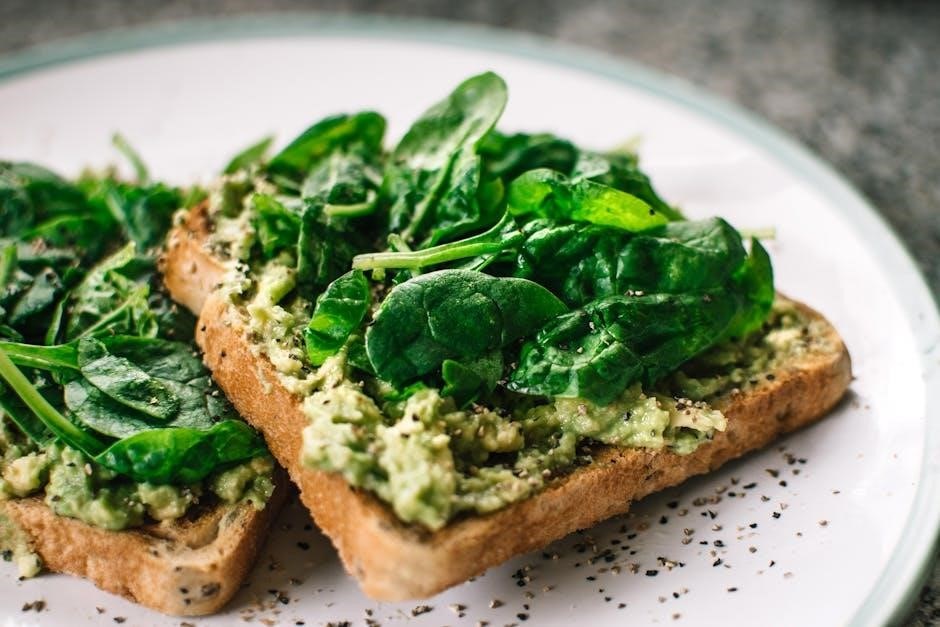Understanding PCOS and Its Impact on Nutrition
Polycystic Ovary Syndrome (PCOS) is a hormonal disorder impacting insulin resistance‚ weight management‚ and metabolism. Nutrition plays a critical role in managing symptoms by balancing blood sugar levels and improving insulin sensitivity‚ which helps regulate hormones and support overall reproductive health.
What is PCOS and How Does It Affect Your Body?
Polycystic Ovary Syndrome (PCOS) is a hormonal disorder affecting women of reproductive age. It is characterized by irregular periods‚ weight gain‚ acne‚ and the presence of cysts on the ovaries; PCOS is linked to insulin resistance‚ leading to high blood sugar levels and hormonal imbalances. Elevated androgen levels contribute to symptoms like excess hair growth and male-pattern baldness. Managing PCOS involves dietary changes to stabilize blood sugar‚ improve insulin sensitivity‚ and balance hormones. A structured meal plan emphasizing whole foods‚ fiber‚ and healthy fats is crucial for long-term symptom management and overall well-being.
The Role of Nutrition in Managing PCOS Symptoms
Nutrition plays a central role in managing PCOS symptoms by addressing insulin resistance‚ hormonal imbalances‚ and inflammation. A balanced diet focusing on whole‚ unprocessed foods helps stabilize blood sugar levels and improve insulin sensitivity. Incorporating complex carbohydrates‚ lean proteins‚ and healthy fats supports hormonal balance and reduces inflammation. Avoiding high-glycemic foods and processed sugars prevents spikes in blood sugar‚ which can worsen symptoms like weight gain and acne. A structured meal plan tailored to PCOS can mitigate symptoms such as hirsutism‚ menstrual irregularities‚ and metabolic issues‚ promoting long-term health and well-being.
Best Diet for PCOS: Key Principles
A PCOS-friendly diet emphasizes balancing macronutrients‚ prioritizing high-fiber foods‚ and avoiding processed carbs to improve insulin sensitivity. Incorporate lean proteins‚ healthy fats‚ and whole‚ nutrient-dense foods for optimal results.

Understanding the Importance of Balancing Macronutrients
Balancing macronutrients—carbohydrates‚ proteins‚ and fats—is essential for managing PCOS symptoms. Carbohydrates‚ especially high-fiber options‚ help stabilize blood sugar‚ while proteins regulate hunger and support metabolism. Healthy fats‚ like avocados and nuts‚ reduce inflammation and aid hormone production. Avoiding refined carbs and focusing on whole‚ nutrient-dense foods improves insulin sensitivity and weight management. A well-balanced diet supports hormonal balance‚ reducing PCOS-related issues such as acne‚ hair loss‚ and metabolic disorders‚ promoting overall well-being and fertility health.
The Role of Fiber‚ Protein‚ and Healthy Fats in PCOS Management
Fiber-rich foods like whole grains and vegetables slow sugar absorption‚ stabilizing blood sugar and improving insulin sensitivity. Protein sources such as lean meats‚ legumes‚ and eggs help regulate hunger and metabolism‚ supporting weight management. Healthy fats from avocados‚ nuts‚ and olive oil reduce inflammation and promote hormone balance. Together‚ these nutrients create meals that manage PCOS symptoms‚ enhance fertility‚ and boost energy levels‚ making them crucial components of a PCOS-friendly diet.
7-Day PCOS Meal Plan Overview
A structured 7-day plan focusing on balanced nutrition to stabilize blood sugar‚ improve insulin sensitivity‚ and support hormone balance‚ offering nourishing meals for optimal PCOS management.
Day 1-7 Meal Plan Examples with Grocery List
This 7-day PCOS meal plan provides structured breakfast‚ lunch‚ dinner‚ and snack ideas‚ focusing on whole‚ nutrient-rich foods. Each day includes balanced macronutrients to stabilize blood sugar and improve insulin sensitivity. Breakfasts feature options like oatmeal with berries and nuts or scrambled eggs with spinach. Lunches include grilled chicken salads or quinoa bowls with vegetables. Dinners emphasize lean proteins‚ such as baked salmon or turkey‚ paired with fiber-rich sides like roasted vegetables or sweet potatoes. Snacks include combinations like Greek yogurt with berries or hard-boiled eggs; A detailed grocery list ensures you’re prepared for the week‚ promoting consistency and adherence to the plan.
Breakfast‚ Lunch‚ Dinner‚ and Snack Ideas for Each Day
Start your day with a PCOS-friendly breakfast like oatmeal topped with berries and nuts or scrambled eggs with spinach. Lunches could include grilled chicken salads with avocado or quinoa bowls with roasted vegetables. Dinners might feature baked salmon with asparagus or turkey lettuce wraps. Snacks like Greek yogurt with berries‚ hard-boiled eggs‚ or veggie sticks with hummus keep blood sugar stable. Each meal focuses on balancing macronutrients‚ incorporating fiber‚ protein‚ and healthy fats to support insulin sensitivity and hormone balance. Stay hydrated with water and herbal teas‚ and consider a morning drink with cinnamon and ginger for added benefits.

Snacks for PCOS: Healthy and Delicious Options
Opt for snacks rich in complex carbs‚ protein‚ and healthy fats‚ such as nuts‚ seeds‚ fruits with nut butter‚ veggie sticks with hummus‚ Greek yogurt with berries‚ or hard-boiled eggs.
Best Snacking Choices to Manage Blood Sugar and Cravings
Snacking wisely is essential for managing PCOS symptoms. Opt for snacks that balance protein‚ healthy fats‚ and complex carbs to stabilize blood sugar and reduce cravings. Nuts‚ seeds‚ and fruits paired with nut butter are excellent choices. Greek yogurt with berries‚ veggie sticks with hummus‚ or hard-boiled eggs also provide sustained energy. Avoid processed or high-sugar snacks‚ as they can worsen insulin resistance. Incorporating fiber-rich options like apples with almond butter or carrot sticks with guacamole helps regulate blood sugar spikes. These snacks not only satisfy cravings but also support hormonal balance and overall well-being‚ making them ideal for PCOS management.
Easy and Portable Snack Ideas for Busy Days
For busy days‚ portable snacks like trail mix with nuts and seeds‚ fruit Leather‚ or energy balls made with oats and nut butter are perfect. Prepping hard-boiled eggs‚ edamame‚ or sliced veggies with hummus ensures quick grabs. Single-serve portions of yogurt‚ cheese‚ or whole-grain crackers with avocado are also convenient. Smoothies in reusable bottles or homemade granola bars offer sustained energy. These snacks are easy to prepare‚ pack‚ and eat on the go‚ making them ideal for maintaining blood sugar balance and curbing cravings without compromising nutritional quality.

Lifestyle Changes to Complement Your PCOS Meal Plan
Exercise‚ sleep‚ and stress management are crucial alongside a PCOS meal plan. Regular physical activity enhances insulin sensitivity‚ while adequate sleep supports hormonal balance. Mindful stress reduction techniques‚ like yoga or meditation‚ further complement dietary efforts to improve overall well-being and symptom management.
Exercise‚ Sleep‚ and Stress Management for PCOS
Regular exercise improves insulin sensitivity and hormone balance‚ while adequate sleep supports metabolic health. Stress management techniques like yoga or meditation can reduce cortisol levels‚ aiding in symptom control. Combining these practices with a balanced diet enhances overall well-being and helps manage PCOS-related challenges. Aim for 150 minutes of moderate exercise weekly‚ prioritize 7-9 hours of quality sleep‚ and incorporate mindfulness practices to maintain emotional and physical health. These lifestyle adjustments‚ alongside a tailored meal plan‚ create a holistic approach to managing PCOS and improving long-term health outcomes.
How to Create a Sustainable Routine for Long-Term Success
Creating a sustainable routine involves setting realistic goals‚ tracking progress‚ and making gradual changes. Start by incorporating small‚ achievable habits into your daily life‚ such as meal prepping or short workouts. Consistency is key to maintaining a balanced diet and active lifestyle. Use tools like planners or apps to stay organized and monitor your progress. Celebrate small victories to stay motivated and adjust your routine as needed. Over time‚ these practices become second nature‚ fostering long-term success in managing PCOS symptoms and improving overall health.

How to Create Your Own PCOS Meal Plan
Start by assessing your dietary needs‚ preferences‚ and lifestyle. Focus on whole‚ nutrient-dense foods‚ balancing macronutrients‚ and managing blood sugar. Consult a healthcare provider or nutritionist for personalized guidance.
Step-by-Step Guide to Personalizing Your Diet
Assess your dietary needs‚ preferences‚ and lifestyle. 2. Focus on whole‚ nutrient-dense foods‚ emphasizing protein‚ fiber‚ and healthy fats to balance blood sugar. 3. Incorporate low-glycemic carbs to manage insulin resistance. 4. Include anti-inflammatory foods like berries‚ leafy greens‚ and omega-3-rich options. 5. Avoid processed foods‚ sugary snacks‚ and saturated fats. 6. Consult a healthcare provider or nutritionist for tailored advice. 7. Track your progress and adjust your plan based on how your body responds. This approach ensures a sustainable‚ personalized diet that supports hormone balance and overall well-being.
Tracking Progress and Adjusting Your Plan as Needed
Regularly monitor your symptoms‚ weight‚ and blood work to assess the effectiveness of your PCOS meal plan. Keep a food diary or use an app to track meals and symptoms. Adjust portion sizes or ingredients based on progress. Schedule periodic check-ins with a healthcare provider to review lab results and hormonal changes. Be patient and flexible‚ as small tweaks can make a big difference. Celebrate improvements and identify areas for refinement to ensure long-term success and optimal health outcomes tailored to your unique needs and goals.
A well-structured PCOS meal plan helps manage symptoms‚ balance blood sugar‚ and improve overall health‚ empowering women to achieve long-term wellness and hormonal balance effectively.
Final Tips for Implementing Your PCOS Meal Plan
Consistency is key to managing PCOS symptoms through diet. Stick to your meal plan‚ focus on balanced macronutrients‚ and prioritize whole‚ unprocessed foods. Stay hydrated‚ listen to your body‚ and adjust portion sizes as needed. Incorporate physical activity and stress management to enhance results. Seek support from healthcare providers or online communities for motivation. Track your progress and celebrate small victories. Remember‚ this is a lifestyle change‚ not a quick fix. By committing to these habits‚ you can improve hormonal balance‚ boost energy‚ and enhance fertility‚ paving the way for long-term health and well-being.
Resources for Further Support and Guidance
Downloadable PDF meal plans and guides offer structured support for managing PCOS. Websites provide free 7-day meal plans‚ grocery lists‚ and recipes tailored for blood sugar control and hormone balance. Online communities and forums connect you with others sharing similar journeys. Consider consulting a registered dietitian or healthcare provider for personalized advice. Additional resources include cookbooks‚ webinars‚ and apps focused on PCOS nutrition. These tools empower you to make informed decisions and stay motivated on your path to better health and symptom management.
